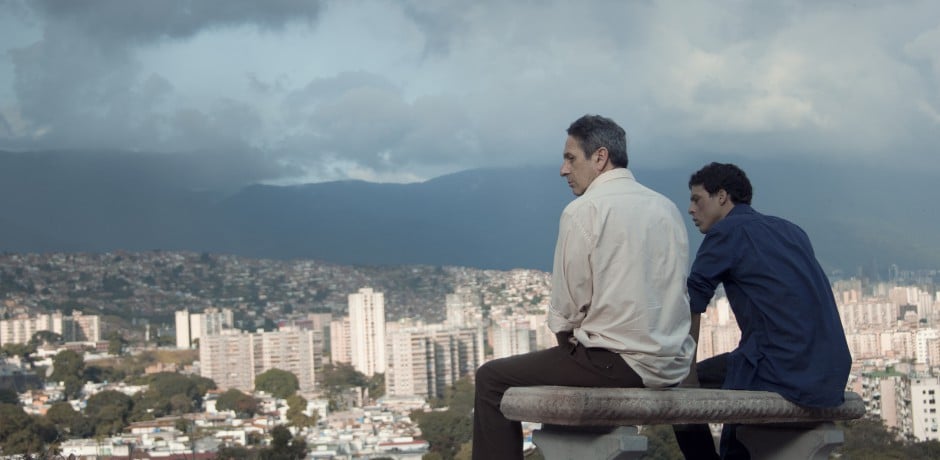Film review: Desde Allá @ HOME’s ¡Viva! Film Festival
May 3, 2016

Photo Credit: Desde Allá (2015) @ HOME Manchester
The Venezuelan ‘Desde Allá’ (English title: ‘From Afar’) is the breakthrough feature debut by Lorenzo Vigas which triumphed this year at the Venice Film Festival. An emerging director with a Venezuelan degree in molecular biology, Vigas seems an unlikely window to the realities of the deeply troubled and impoverished capital city, Caracas. While differing in upbringing and education from the criminals he depicts in the feature, he provides an insight into the utterly fascinating microcosm that is Venezuelan life – albeit from afar – but in a way that we feel almost uncomfortably close.
The opening scenes follow Armardo (Alfredo Castro), a middle aged, brooding dentist, combing through the chaotic, noisy, and dirty city of Caracas, in an attempt to quell his loneliness. Vigas shows us this through the sequence of short sexual exchanges Armardo has with various criminal city boys that he first attracts through sly eye contact, luring them with a no-need-for-words offer of a flash of a wad of cash in a downtown spot. It is always them following him back to his home – indicative clearly of the mercy the poor are at to the rich in Venezuela. Also, for a country falling fast behind in addressing discriminative global issues such as homophobia, Vigas no doubt intentionally surprises and unsettles his audience by throwing them in as witnesses of an immediately uncomfortable dynamic of a more powerful man using young, vulnerable boys as disposable objects. However, his apparently straight forward pick-ups become rocked by the choosing of Elder, one of the more dominant street boys. Despite his name, he is naïve to the power of love and attention, having been starved of it since birth (his mother later disowns him overnight when she realises he is homosexual, and his father abused him before being imprisoned). Elder is a deeply frustrated young Venezuelan boy who exhibits intense violence and sexual promiscuity from the offset in a vain to attempt to quieten this deep dissatisfaction that comes from growing up as a child of such a complicated and tainted land, a struggle which we painfully see carried on consistently to the ending credits.
This turbulence never settles between them as the film progresses, only deepening as Elder becomes the one reaching out for attention, mistaking it for love. The presence of this confused combination of emotion and aggression was always going to be an intrinsic part of such a film; Venezuela is a country with one of the highest homicide rates in the entire world, and Caracas has the highest homicide rate within Venezuela. While the middle to upper classes get on with day to day life with a fairly comfortable ignorance of the violent underworld that they tread on, the poorer – which the majority of citizens are – cannot. This is why Armardo is such an interesting lead character; we question, as passive observers, him silently leave his homely apartment again and again to cross the town’s border between rich and poor in pursuit of excitement. Why, when he could live the uncomplicated life that his emotional hostage Elder craves so deeply? This search for more is clearly reflective of the wider atmosphere in Venezuela. It is an unbelievably tense country – every aspect of life there is strained to its taut limit. The politics, the education system, the class divide -everything is an extreme. And this, again, is reflected in the two leading characters: they are polar opposites of one another, yet they are intrinsically linked – both are, emotionally, orphans with a particularly difficult connection to their fathers. Everything is in conflict, but they find a way to not only survive, but fully develop lives alongside one another, which is the only way to survive in such a place.
Multiple world surveys consistently show Venezuelans to be among the happiest people in the world, which indicates how resilient they are and will no doubt always be. Vigas chooses to film in such a simple, seemingly distant way to show us that we need to take a step back and just observe. He knows that fixing Venezuela will be a complex process. So he offers no solution in ‘From Afar’, nor does he search for one in his broken dialogue. It is always that Armardo and Elder are dodging questions at different times, from marriage to the whereabouts of their fathers. Perhaps Vigas is suggesting that if the right people finally begin answering, Venezuela will be able to again be famous for its many amazing talents, not the disturbing and destructive ones.
Filed under: Film, TV & Tech
Tagged with: film, film festival, film review, homemcr, latin america, manchester



Comments